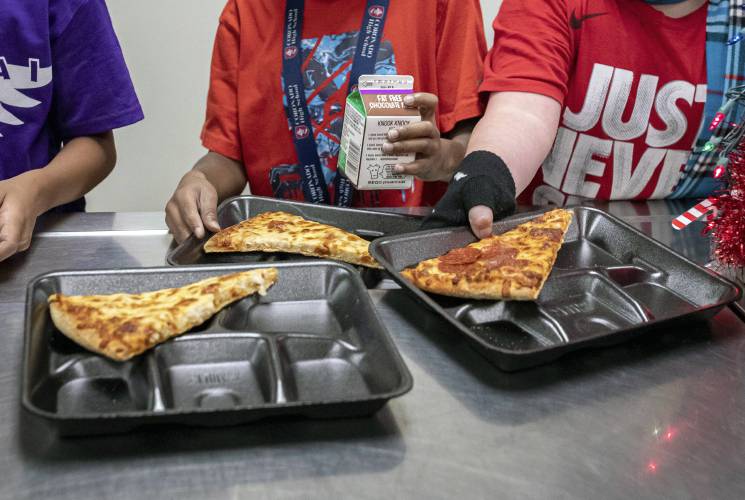Opinion: New Hampshire’s budget leaves hungry children behind

Second-grade students select their meals during a lunch break in the cafeteria, Dec. 12, 2022. (AP Photo/Alberto Mariani, File) Alberto Mariani
| Published: 06-29-2025 4:00 PM |
New Hampshire households are struggling with the ripple effects of rising costs of housing, childcare and food. But hardship doesn’t have to lead to hunger.
Whether or not it does depends on the choices our legislators make about state priorities and funding. And this year, the New Hampshire legislature has so far missed key opportunities to ensure that no children in New Hampshire were hungry in school.
Presented with widespread public support and viable, low and no-cost policy solutions proven to address child hunger, lawmakers chose not to act. They declined to advance multiple initiatives that would have helped ensure that over 10,000 more low-income children were fed school meals.
Most notably, the budget does not include funding for a Medicaid Direct Certification pilot program, in which families of Medicaid-enrolled children who qualify could opt-in for automatic enrollment in free and reduced-price school meals. This approach would have had no fiscal impact on the state’s education funding formula and would have streamlined access for families who already qualify without additional administrative hurdles.
Another bill, to raise eligibility for free meals to 200% of the federal poverty level, also failed to advance. Schools would have had the option to participate and the state and schools would have split the costs, alleviating school meal debt and ensuring that more children had access to healthy meals at school.
Legislators from both parties championed these proposals, understanding that feeding children in need should not be a partisan issue. It’s simply the right thing to do and it makes practical sense. The response from the majority in the House and Senate, however, has been disheartening.
Instead of allocating funds to fight child hunger, legislators chose to add $49.6 million to the Rainy Day Fund. Some dismissed the issue entirely, advising struggling families to “go pick berries,” rather than supporting solutions proven to fix the underlying problems causing hunger.
Childhood hunger in New Hampshire is real, and it should concern all of us. When children are hungry, not only can they not learn effectively but their long-term health is compromised. The charitable food system, food banks and pantries, does important work, but they were not designed to solve hunger. They’re designed to offer temporary help in emergencies or when government support falls short.
Article continues after...
Yesterday's Most Read Articles
 One person trapped, killed in Manchester Street fire
One person trapped, killed in Manchester Street fire
 Ayotte vetoes bathroom bill, defeating it for second time in two years
Ayotte vetoes bathroom bill, defeating it for second time in two years
 Concord may finally buy long-closed rail line with hopes of creating city-spanning trail
Concord may finally buy long-closed rail line with hopes of creating city-spanning trail
 Free speech group, residents back Bow parents’ appeal in case involving transgender athletes
Free speech group, residents back Bow parents’ appeal in case involving transgender athletes
 Concord city council divided over raise for city manager to nearly $250K
Concord city council divided over raise for city manager to nearly $250K
 Cannon Mountain tram to shut for at least two years while replacement is installed
Cannon Mountain tram to shut for at least two years while replacement is installed
These are not just problems of individual families – these are systemic problems that require systemic solutions. When we fail to ensure children have enough to eat, we undermine the very foundation of our state’s future.
Despite setbacks in this legislative session, we’re hopeful because we know how to fix this. We have solutions that work; we just need our leaders and the public to get behind them. There are clear steps we can take. Funding the Medicaid Direct Certification pilot program remains a viable, virtually no-cost option.
Other proven solutions exist to alleviate child hunger and help working families. State leaders have a responsibility to make government work for the people of this state, so we will continue to hold them accountable for reducing barriers, streamlining administrative processes and strengthening the supports that are there for everyone when we need help.
As a state, we have a choice to make. Do we want to foster the health and well-being of our children – this next generation of teachers, business owners, community leaders – or will we refuse to address the barriers to their well-being and to our state’s progress? Hunger is real, but so is our capacity to solve it.
New Hampshire Hunger Solutions stands ready to work with legislators, community and business leaders and families to ensure no child faces hunger in our state.
Laura Milliken is the executive director of New Hampshire Hunger Solutions.







 Opinion: Trumpism in a dying democracy
Opinion: Trumpism in a dying democracy Opinion: What Coolidge’s century-old decision can teach us today
Opinion: What Coolidge’s century-old decision can teach us today Opinion: The art of diplomacy
Opinion: The art of diplomacy Opinion: After Roe: Three years of resistance, care and community
Opinion: After Roe: Three years of resistance, care and community
